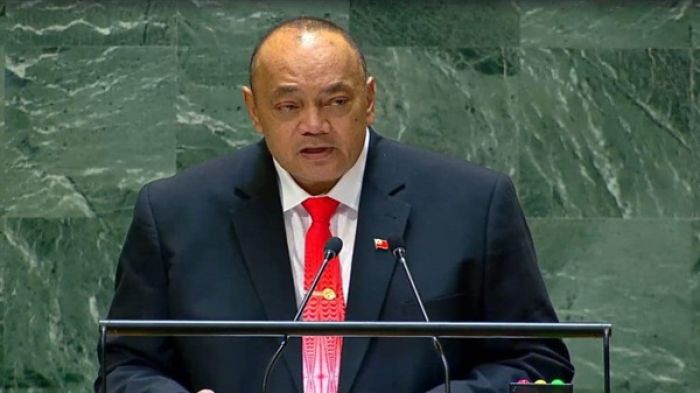Prime Minister of Tonga delivered Tonga's statement to United Nations General Assembly
 Prime Minister of Tonga Hon. Hu'akavameiliku
Prime Minister of Tonga Hon. Hu'akavameiliku
29 September 2024. On the occasion of the General Debate at the Seventy-Ninth Session of the United Nations General Assembly Friday, 27 September 2024 United Nations Headquarters, New York, the Prime Minister of Tonga delivered Tonga's statement.
The Prime Minister was accompanied to the General Debate at the Seventy-Ninth Session of the United Nations General Assembly by the Minister of MEIDECC Hon. Fekitamoieloa 'Utoikamanu, Minister of Trade & Economic Development and Minister of Tourism Hon. Dr. Viliami Uasike Latu, Speaker of Parliament Lord Fakafanua, Chief Secretary & Secretary to Cabinet Paula Ma'u, Permanent Representative of Tonga to the United Nations HE Va'inga Tone, CEO of Land & Survey Taniela Kula and Tongan Government officials.

Hon. Hu'akavameiliku while deliverning Tonga's Statement. In the backgorund is Hon. Fekita 'Utoikamanu chairng the session under Tonga's capacity as Vice Presitent of the General Assembly

Please find below the content of the Prime Minister's Statement.
Tapu mo e ‘Otua Mafimafi ‘oku ‘i hotau lotolotonga.
Mr. President,
Malo e Lelei! Warmest Pacific greetings from the Kingdom of Tonga and our Blue Pacific region!
First, I wish to congratulate Your Excellency on assuming the esteemed presidency of the 79th session of the United Nations General Assembly.
I also thank your predecessor, His Excellency Mr. Dennis Francis, for his able leadership during a period where global challenges continued to increase in numbers and complexity.
I acknowledge the Secretary-General, His Excellency Mr. António Guterres, for his steadfast stewardship of our home, the United Nations during these troubled times.
Mr. President, We convene at this 79th session with the theme of ‘Leaving no one behind’. My delegation pledges our unwavering support to this noble goal.
At a time of escalating conflicts, near-conflict situations on the horizon, all too often triggered by political instability, economic disparities, social tensions and the security threats posed by climate change, we must rally around this goal. If we fail to do so, we will further erode world peace and fail peoples’ lives far and wide.
The long-awaited reform of the Security Council is now urgent, crucial and must happen swiftly. It is our responsibility to resolve adequately the security challenges of the 21st century. We must include non-traditional security issues like climate change, in its agenda. Further, we must include the voice of Small Island Developing States.
In our quest to leave no one behind, we must take a hard look at the lagging progress in achieving sustainable development by 2030. This goal is equally imperiled unless we change our approach.
Human dignity is intrinsically built on both peace, security and sustainability. If we cannot act NOW decisively and collectively, the goal to leave no one behind will be just words and we will have further eroded peoples’ trust and hopes.
The key is not words, the key is our shared commitment to action.
Mr. President,
I commend the tireless efforts that have led to the ambitious and balanced text of the Summit of the Future. Not only do we stand at a critical juncture in our collective history, but it is NOW where we must safeguard the needs and interests of both present and future generations.
The spirit of compromise and commitment demonstrated by delegations and regional groups gives us hope that multilateralism can work.
As our forebearers, our founders did, we pledge to spare succeeding generations from the scourge of war, we commit to building a world where there is hope and they can thrive.
Our commitment must be to sustainable development, to the preservation of our planet’s resources, and to the pursuit of a future that is inclusive, equitable, secure, and sustainable. We must commit to the highest values of human dignity and justice.
Thus, we welcome the adoption of the Pact for the Future. We are resolute in our commitment to working collaboratively with member states to advance peace, sustainable development, and human dignity.
We hope for action that will leave no one behind.
Mr. President,
Last month, Tonga assumed the chairmanship of the 53rd Pacific Islands Forum Leaders Meeting.
We were honored to welcome Secretary-General Guterres as a special guest. I reiterate our Forum Leaders’ and Pacific people’s deep gratitude for his in-person participation. We now look forward to continued and augmented support and tailored solutions from the United Nations in our efforts for our peoples’ lives and futures.
The theme of our meeting was ‘Resilience: Building Back Better Now,’.
The urgency of our theme certainly was underscored by the torrential rains, flash flooding, and 6.5 magnitude earthquake that struck Nuku’alofa on the first day of the meeting.
This was yet another stark reminder of our vulnerability to natural disasters. Once again, it also demonstrated our unwavering resilience, and the priority we place on the full implementation of our early-warning for all initiatives by 2027, and for disaster preparedness.
Mr President,
The 2024 Sustainable Development Goals Report before us is grim.
The report reveals what we see every day on the ground: a stark divergence from the ambitious targets set forth in the 2030 Agenda. Climate change, escalating inequalities, and persistent conflicts are compounding challenges, leaving many countries struggling to meet even the most fundamental goals.
Without urgent and coordinated global action, the vision of a more equitable and sustainable world may remain just another elusive dream. This means eroded trust in our ability to keep promises, it will jeopardize both our planet and its inhabitants. We must, and we can, confront these seemingly insurmountable challenges with innovation and determination. We can no longer afford business as usual.
Mr. President,
Decade after decade, year after year, we present to this esteemed body the existential threat that climate change poses to the Pacific, including Tonga.
Our situation has become even more urgent this year.
Climate change is the single greatest threat to the survival and prosperity of our Blue Pacific region.
Once again, we urge the international community to promptly and dramatically act to restrict global warming to 1.5°C. Industrialized nations must strengthen their emissions reduction commitments. We must ensure that climate finance is speedily and easily accessible to Pacific Island nations.
Let there be no doubt, we are teetering on the brink of a climate catastrophe.
While in Tonga, the UN Secretary-General issued a global SOS (Save our Seas), warning of rising sea levels. The World Meteorological Organization echoed this urgent message, launching the ‘State of the Climate in the South-West Pacific 2023’ report.
The report confirms that 2023 was the warmest year on record. The scientific consensus is irrefutable—our climate is changing at an unprecedented rate, with devastating consequences. Extreme weather events are becoming more frequent and intense. Cyclones and typhoons are wreaking havoc on our communities, leaving behind trails of destruction that take years to repair. The economic toll is immense, but the human cost is far greater—lives lost, communities shattered, hopes lost and futures uncertain.
Mr. President,
The most alarming aspect of the crisis is the unprecedented rise in sea levels. The WMO report confirms that sea-level rise in the South-West Pacific is significantly exceeding the global average. In some parts of the Pacific, sea levels have risen by 10 to 15 centimeters in the past 30 years—more than double the global average.
Without bold and coordinated global action to expedite assistance to the Pacific and its most vulnerable inhabitants, Tonga and other Pacific countries can expect sea levels to double by mid-century. This will exacerbate the frequency and severity of storm surges and coastal flooding.
For the nations of the Pacific, these changes are not merely environmental issues; they are existential threats that jeopardize the very existence of Small Pacific Island countries, including Tonga.
Rising sea levels are eroding coastlines, swallowing entire islands, and forcing families to abandon their ancestral homes. This is not just about losing land; it is about our very identities, loosing heritage and culture.
We issued a strong call for including sea-level rise as a standalone and permanent agenda item in the UNGA and other relevant UN processes.
Mr President,
Twelve Pacific countries have signed up to the Agreement on Marine Biodiversity of Areas beyond National Jurisdiction (BBNJ) further affirming the priority placed on the need to protect the ocean, promote equity and fairness, tackle environmental degradation, fight climate change and prevent biodiversity loss in the high seas.
Mr President,
The upcoming COP29 presents a critical opportunity to operationalize the Loss and Damage Fund, transforming and honoring of pledges into tangible support for vulnerable nations. We once again reiterate our call that the vulnerable SIDS countries must be provided with increased and streamlined admission to the Loss and Damage mechanism. Further, while upholding complete accountability, we must establish more efficient and swift means of accessing standard operating procedures.
Mr. President,
Our ocean, seabed, and land are simply who we are, they are invaluable to us.
As I mentioned earlier, the severe and irreversible threats posed by climate change-related sea-level rise will disproportionately impact the lives, livelihoods, food security, ecosystems, and well-being of our people.
We have established key declarations. For example, the 2023 Declaration on the Continuity of Statehood and Protection of Persons amidst sea-level rise, and the 2021 Declaration on Preserving Maritime Zones against climate impacts.
We have also developed and endorsed the Pacific Regional Framework on Climate Mobility and introduced the Framework for Resilient Development in the Pacific; the latter is the world's first regional framework linking climate change and disaster risk.
NOW, we need to act on this.
We commend the United Nations for addressing this critical issue and welcome the high-level plenary meeting on ‘Addressing the threats posed by sea-level rise.’
The 2023 PIF Declaration on the Continuity of Statehood takes a clear stance on protecting Pacific peoples’ rights and sovereignty. By asserting the continued existence of Pacific Island Forum Members’ statehood, sovereignty, and rights and duties, the Declaration underscores our determination to safeguard both the territorial and human dimensions of our states under international law.
The Declaration commits to protecting persons affected by climate change, ensuring that human rights, political status, cultural heritage, identity, and dignity are upheld. We call for global cooperation to achieve the Declaration’s objectives, in line with international principles of fairness, equity, and shared responsibility.
Mr. President,
Yes, the challenges we face are immense. But they are not insurmountable. The resilience of the Pacific peoples is legendary.
Through centuries, our communities have weathered countless storms, adapted to changing conditions, and preserved our rich cultures through adversity. Now more than ever, we must draw upon this resilience.
It is NOW that our Forum Islands countries urgently require timely, predictable, and scaled-up access to climate finance to protect our communities.
Tonga is proud to announce the establishment of the Pacific Resilience Facility (PRF), a Pacific-led, member-owned, and managed climate and disaster resilience financing facility.
Tonga will host the PRF office and we acknowledge the commitments and contributions received from our development partners and friends of the Pacific thus far.
We call upon global partners to support our Pacific-led solution, the PRF. The key goal is to bridge the financing gap for smaller, high-impact adaptation projects. I would like to once again thank the UN Secretary-General for his leadership and commitment in supporting the Pacific Islands Forum by convening a global pledging event for the PRF in 2025.
Mr President,
Work continues including the receipt of pledges on an innovative investment initiative supported by Forum Leaders, Unlocking Blue Pacific Prosperity, co-chaired by the Leaders of Palau, Tonga and Bezos Earth Fund. The goals of the Fund is to achieve 100% sustainable ocean conservation and management; Healthy Pacific people supported by robust food systems and resilient ecosystems; and fit for purpose financing in support of the 20/50 implementation.
We again urge multilateral climate funds, such as the Green Climate Fund and Adaptation Fund, to establish dedicated climate finance access windows, tailored to the conditions and needs of vulnerable countries like the Pacific Small Island Developing States.
Mr. President,
We appreciate the support for the new ten-year blueprint recognizing the special case of Small Island Developing States (SIDS), the Antigua and Barbuda Agenda for SIDS (ABAS).
This agenda goes beyond being a mere policy framework. This is our collective vision for sustainable growth and resilience in the face of unprecedented challenges.
We support the allocation of resources and tailored systems to facilitate the implementation of the concrete actions outlined in the ABAS’ ten thematic areas.
At the same time, reforming the international financial architecture will be crucial to support this new program of action. This includes three substantive global policy agendas—redefining eligibility for development resources, improving access to climate finance, and creating long-term debt sustainability.
Implementing the ABAS is a vital step toward accelerating the achievement of the Sustainable Development Goals by 2030. We request the support of key entities within the United Nations system to help implement the ABAS.
Recognizing our unique vulnerabilities, my fellow Pacific Islands Forum Leaders welcomed the adoption of the Multidimensional Vulnerability Index (MVI). This practical instrument, advocated for over many years by SIDS, offers a more comprehensive understanding of vulnerability, providing renewed hope and impetus to the 2030 Agenda through a more context responsive approach.
We look forward to the operationalization of the MVI in relevant UN settings and urge international organizations and financial institutions to consider MVI ratings in their eligibility criteria for grant and concessional financing.
Mr. President,
The opinion may be that our Pacific communities are remote and small. Let there be no doubt, our economies continue to suffer like so many from the effects of geopolitical tensions and supply chain disruptions.
Our people suffer from rising inflation and we go through increased hardship, and deepening poverty, particularly for the most vulnerable in our Blue Pacific region.
However, and at such critical times, the Pacific Islands Forum is steadfast in its commitment to building a resilient Pacific region of hope and prosperity that ensures all Pacific peoples can lead productive lives.
We invite all partners to support our development aspirations outlined in our 2050 Strategy for the Blue Pacific Continent and our forthcoming Pacific Roadmap for Economic Development.
Resilient transformation demands for Pacific peoples to have access to quality, affordable, accessible, and inclusive health and education services. Our Blue Pacific region will focus on improving climate-resilient healthcare and education infrastructures and digital platforms to mitigate risks, manage climate-sensitive diseases and non-communicable diseases (NCDs) effectively, and ensure continuity and equity in learning across our Blue Pacific region.
We remain resolute in our commitment to the global fight against NCDs. We reaffirm our commitment to building stronger partnerships between government sectors and other relevant sectors to address the root causes of NCDs through a holistic whole-of-government, whole-of-society approach.
Addressing the global plastic pollution problem, especially in the marine environment, is a priority. This is a threat to our ecosystems and health. The Pacific Ocean is our Pacific identity. It is a vital resource for food and livelihoods. A healthy ocean will aid in our fight against climate change.
Mr President
The actions of the Government of Tonga focus on three key thematic areas: national resilience, quality services and affordability, and progressive economic growth.
Our goal is to enhance national resilience by creating stronger platforms to tackle natural disasters and address the persistent issues brought about by climate change. We aspire to alleviate relative poverty and improve the quality of social protection measures. We will also mobilize national and international responses to reduce the supply and use of illicit drugs and address harm reduction processes.
We aim to enhance education for everyone, prioritizing safer schools, tackling dropout rates, advocating for gender equality, and expanding vocational training opportunities, all while ensuring quality services and affordability. Our efforts are also directed towards improving access to healthcare that is both affordable and of high quality, with a particular emphasis on addressing COVID-19, non-communicable diseases, and preventive measures.
Our focus is on developing government services that are of exceptional quality and can be easily accessed by all. This entails enhancing access to high-speed broadband technology and ensuring that energy, communication, drinking water, and a clean environment are more affordable.
Our main objectives for fostering progressive economic growth include giving priority to trade and private sector development, enhancing the quality and accessibility of public infrastructure, and forging stronger partnerships to drive development.
Mr. President,
As I conclude, allow me to close the circle and come back to the critical element of this session’s theme: ‘Leaving no one behind.’
This aspiration must be our guide for eradicating poverty, ending discrimination, and upholding the fundamental rights of individuals, reducing inequalities and vulnerabilities that not only undermine our shared humanity but also leaves too many without hope.
The advancement of one community or nation cannot occur in isolation from the well-being of others. By embracing a fair and equitable playing field, we foster a more resilient and harmonious global society, advancing peace, sustainable development, and human dignity.
We must travel the path to enduring peace and sustainable development with a sense of urgency, just as others have done before us.
In this, let us be guided by shared values of justice and human dignity.
Our collective endeavor to leave no one behind must ensure every person’s potential is recognized, their rights upheld, and so we must bridge gaps, dismantle barriers, and amplify voices that have historically been marginalized—this is what we owe present and future generations.
I thank you and may God bless the United Nations.



